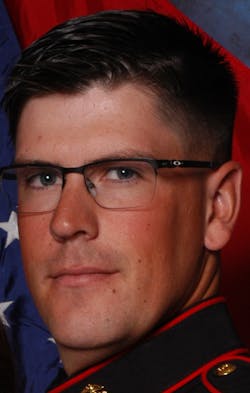Unlike many aviation mechanics, James Matlock didn’t grow up dreaming about airplanes. Instead, he came to PIA with a purely practical goal.
“After I left the Marines, I originally went to school to learn a trade that paid good money in an in-demand industry,” says Matlock. “I really had no specific interest in aviation until about halfway through my first semester at PIA. The passion and enthusiasm that the instructors bring to their lessons not only sparked a massive interest in me, but also in my classmates.”
Matlock’s growing interest in aeronautics kept him focused on the work at hand, but he says it was the time and attention invested by PIA’s instructors that really made the lessons click.
“A significant amount of time and effort is given by all PIA instructors to ensure that the material they teach is also being understood,” says Matlock. “For example, as someone with no electrical experience whatsoever, figuring out the electrical troubleshooting boards challenged me harder than I ever thought possible. But the reason I eventually figured it out was because I had teachers who didn’t get frustrated, give up, or just hold my hand and baby me through it. Instead, they helped me to reason out how and why the circuits worked, and their guidance has helped me retain that knowledge long after the project ended.”
After graduating from PIA Hagerstown in December of 2020, Matlock began work at Dowty, a GE aviation company specializing in the manufacture, repair, and overhaul of propellers. Dowty products are used in a wide variety of aircraft ranging from regional airliners to military airlifters and marine hovercraft.
“My most memorable moment was walking into the shop on my first day and seeing massive 800-pound propellers dangling from lifts while mechanics worked underneath,” recalls Matlock. “The sheer size of the large-scale plane components leaves you kind of awed. Also, the first time I performed a solo composite repair and my peers came up to inspect my work and congratulated me on a perfect job really resonated with me. There's an immense sense of accomplishment you receive when people who've been doing a job for years praise your work.”
For anyone considering a career in aviation maintenance, Matlock believes the hands-on skills can always be taught. But as a former infantryman who decided to learn aviation from the ground up, he also believes that a person’s attitude is what really makes a difference.
“My biggest piece of advice is that your work ethic and attitude are what carry you through the rest of your life,” says Matlock. “If you can use them to your advantage, you'll not only be immensely successful, but you'll also be a valued asset to whatever company is fortunate to bring you aboard.”
Matlock isn’t the only graduate with in-demand skills. 95% of his classmates who are eligible graduates from the Hagerstown Campus started working in the aviation industry or in a field utilizing their PIA education for the time period of July 1, 2019 to June 30, 2020. The average PIA starting salary generally ranges between $37,440 and $49,920, while the industry median salary for 2020 was $66,680 according the Bureau of Labor Statistics. While PIA cannot guarantee employment, graduates receive one-on-one and ongoing placement assistance. Recent graduate employment includes Piedmont Airlines, Mitsubishi Aircraft, Republic Airways, Endeavor Air, and Plane Care.
The Boeing Technician Outlook, North America points to a need for 192,000 qualified aircraft maintenance technicians between 2020 and 2039.


